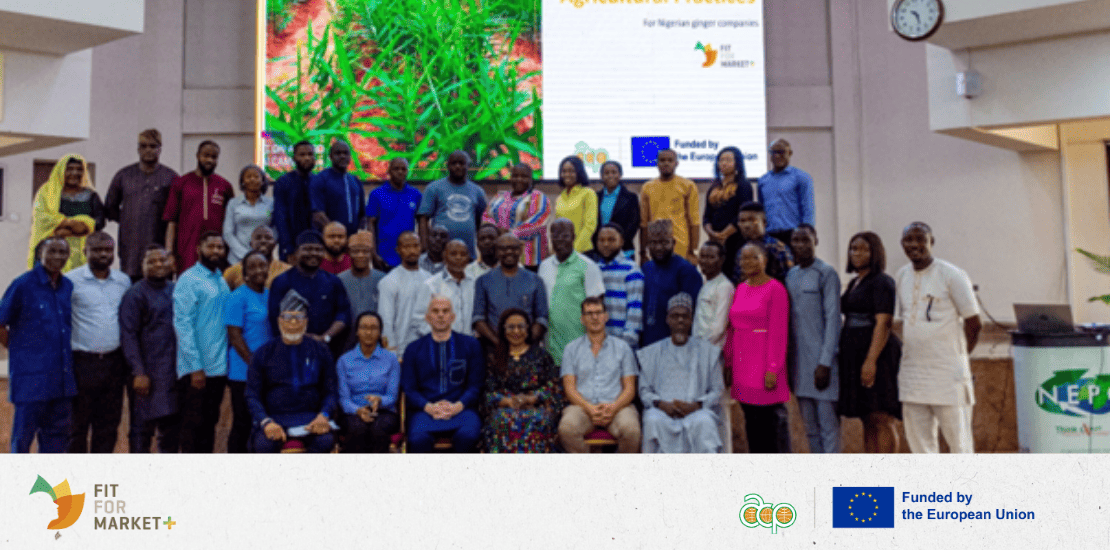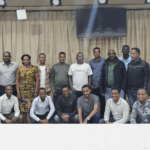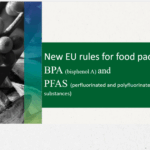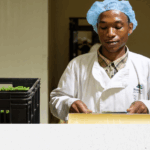- 29/10/2024
- Posted by: Sandra Borma
- Category: News

Tackling an epidemic that is wiping out ginger production in Nigeria: an example of a successful progressive and participatory approach
In response to a devastating disease outbreak that has wiped out 85% of ginger production in Kaduna State, Nigeria, COLEAD has worked under FFM+ with local and international partners to develop a phased strategy to mitigate the impact and restore ginger production.
Ginger is an important economic crop for Nigeria. Kaduna is the hub of Nigeria’s ginger production, known for its distinctive flavour and aroma. However, the 2023 ginger production season was severely affected by a disease outbreak, causing widespread losses to farmers, many of whom had taken out loans to finance their crops. COLEAD, in collaboration with the Nigerian Export Promotion Council (NEPC), the Centre for the Promotion of Imports (CBI), the International Institute of Tropical Agriculture (IITA) and other stakeholders, has developed a four-phase approach under FFM+ to address this crisis.
Phase 1: Detection and initial response (mid-2023)
During the 2023 ginger growing season, farmers in southern Kaduna noticed that their plants were wilting due to an unknown disease. Despite early signs, there was a delay in identifying the cause, resulting in an 85% crop loss by the end of 2023. The disease affected not only farmers, but also aggregators, transporters and exporters, leaving many unemployed and unable to repay loans.
COLEAD was alerted by one of its partner beneficiaries and began communicating with local stakeholders to gather information. Initial samples were sent to CABI for analysis, but security issues hampered the process.
Phase 2: Preliminary analysis and stakeholder engagement (late 2023)
COLEAD undertook a remote assessment through its national relay, Louise Abayomi, who identified key stakeholders. This phase involved establishing links with Nigerian exporters and key research institutions such as IITA and Nigerian Root Crops Research Institute (NRCRI). Through exchanges at international forums such as the ANUGA trade fair in Cologne, Germany, COLEAD worked with CBI and NEPC to gather inputs from the Nigerian ginger export sector. However, in early 2024, the specific cause of the outbreak remained unidentified and a Ginger Blight Epidemic Control Taskforce was formed at the national level. The taskforce includes stakeholders from NRCRI, IITA, NEPC and the Dutch Embassy, all working to control the epidemic.
Phase 3: Field trials and testing of solutions (early 2024)
Recognising the need for practical solutions, COLEAD and its partners initiated a series of field trials. The trials, which will run until the end of the 2024 production season, aim to identify sustainable agricultural practices to combat the outbreak and improve ginger yields. Key issues being investigated include :
- The use of organic and conventional crop protection products
- Testing of crop density and field lay-out
- Waterlogging and other agronomic challenges exacerbated by extreme weather conditions
COLEAD supported three trials under FFM+, while CBI has committed to funding two additional trials. These trials are critical to understanding the causes of the disease and demonstrating good agricultural practices that can prevent future outbreaks.
Phase 4: Ginger good agricultural practice training (September – October 2024)
During the analysis of the ginger situation in Nigeria, a common observation among companies was the lack of common records and reporting on fields. In addition, it was observed that many farmers are not fully informed about preventive and curative measures against fungal/bacterial wilt in particular and good agricultural practices in general. It was therefore agreed that the results of the trials should be shared as part of a more general training on GAPs for ginger.
This training was prepared and delivered by COLEAD’s Training and Technical Assistance Department in Abuja, Nigeria, from 30 September to 3 October. The participants are the technical staff and representatives of ginger producers/exporters that had applied for support under FFM+, CBI’s Ginger Nigeria Programme and the Nigerian Export Promotion Council (NEPC).
This training was a collaborative effort between all three parties, with NEPC providing the venue, CBI logistics and COLEAD providing the training content, trainers, accommodation and other logistics. A total of 26 participants from 15 companies and the Nigerian Root Crops Research Institute attended the training, with an additional 4 export coaches from NEPC.
Phase 5: Long-term support and sustainable practices (ongoing)
The final phase of COLEAD’s approach focuses on long-term resilience. Beyond the immediate trials, COLEAD is working with stakeholders to implement sustainable agricultural practices that will improve ginger production for years to come. This phase includes
- Ongoing monitoring of the trials
- Dissemination of results to ginger farmers and exporters
Through partnerships with NEPC, CBI, NRCRI, IITA and other institutions, COLEAD will continue to support the Nigerian ginger sector by promoting good agricultural practices and improving market access.
COLEAD’s phased and participative approach demonstrates its commitment to long-term sustainability and resilience, in line with its mission to contribute to the achievement of the United Nations Sustainable Development Goals (SDGs) by supporting sustainable agrifood systems.
This activity is supported by the Fit For Market Plus (FFM+) programme, implemented by COLEAD within the Framework of Development Cooperation between the Organisation of African, Caribbean and Pacific States (OACPS) and the European Union. This publication receives financial support from the European Union and the OACPS. The content of this publication is the sole responsibility of COLEAD and can in no way be taken to reflect the views of the European Union or the OACPS.





